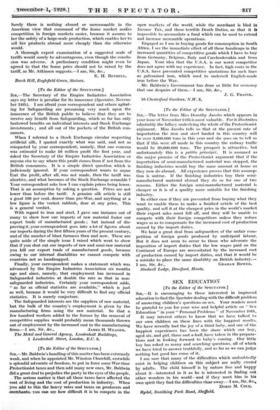[To the Editor of the SPECTATOR.]
Sia,—The Secretary of the Empire Industries Association says my letter is for its innocence (Spectator, Ncvem- her 24th). I sin afraid your correspondent and others agitat- ing for Safeguarding are presinning veiy much Upon the innocence of the British public to believe that they are to receive any benefit from Safeguaidirig, which 'so far has Only bestowed benefits on individual interests and Stock E#hange investments ; and all Out of the- pockets of the British con- sumers.
When I referred to a Stock Exchange circular respecting artificial silk, I quoted exactly what was_ as said, and not as misquoted .13* your corregpoliderit, namely, that one concern was estimated to Make £6- Million profit the first year, and asked the Secretary of the Empire Industries Associaticin or anyone else to say where this profit Comes from if not from the British consumers. It is a simple direct question which is judiciously ignored. If your correspondent wants to argue that the profit, after all; was not made, then the tariff was abortive, and what becomes of the Stock Exchange scramble ? Your correspondent asks how I can explain prices being lOwer. That is an assumption by asking a question. Prices are not lower than before the tariff. A genuine silk article is still a good 100 per cent. dearer than pre-War, and anything at a low figure is the veriest rubbish, dear at any price. This is a general verdict.
With -regard to iron and steel, I gave one instance out of Many to show how our imports of raw material foster our export trade of manufactured goods ; but instead of dis- proving it, your correspondent goes into a lot of figures about our imports during the first fifteen years of the present century, and of the number of blast furnaces then and now. These are quite aside of the simple issue I raised which went to show that if you shut out our imports of raw and semi-raw material you kill our export trade of manufactured goods, because owing to our internal disabilities we cannot compete with countries not so handicapped.
Finally, your correspondent makes a statement which was advanced by the Empire Industries Association six months ago and since, namely, that employment has increased in Safeguarded industries at double the rate as that in non- safeguarded industries. Certainly your correspondent adds, " as far as official statistics are available," which is just as well, because it would be very difficult to find any official statistics. It is merely conjecture.
The Safeguarded interests are the suppliers of raw material, but the bulk of the country's employment is given by the manufacturing firms using the raw material. So that a few hundred workers added to the former by the removal of competitive supplies would probably mean thousands thrown out of employment by the increased cost to the manufacturing firms.—I am, Sir, &c., JAMES H. WEAGER. The Metal and General Agency, Leadenhall Buildings, 1 Leadenhall Street, London, B.C. 8.








































 Previous page
Previous page